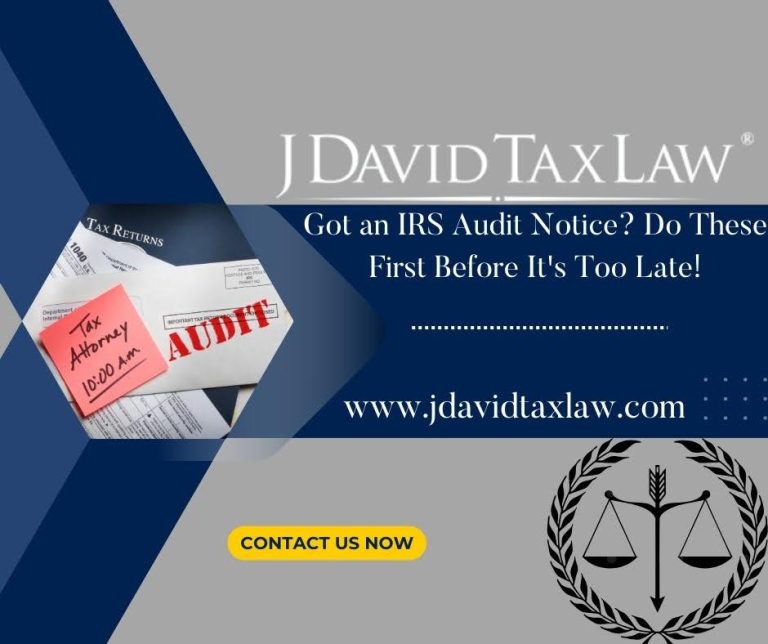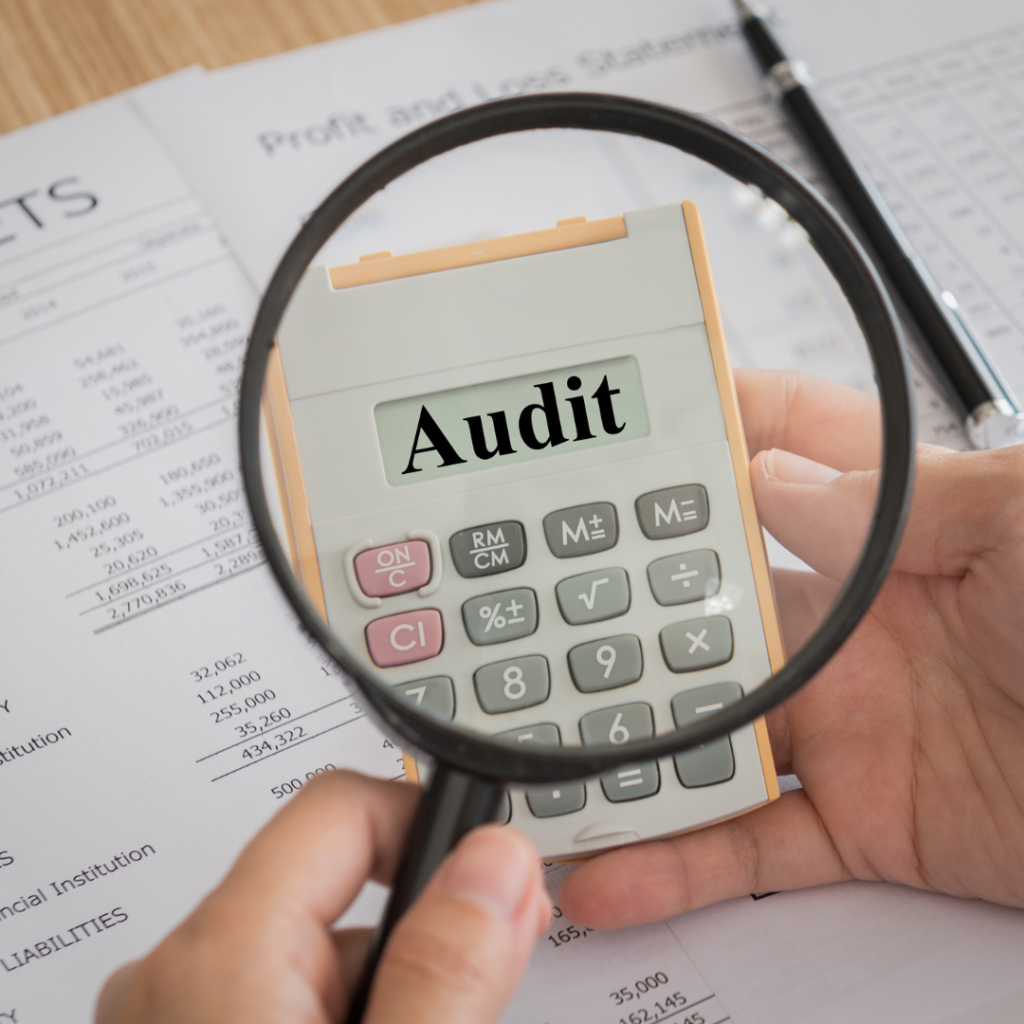
Yes, a tax attorney can negotiate with the IRS on your behalf,reducing penalties and resolving tax debt.Call our IRS tax relief attorney at (888) 342-9436.






A tax audit notice is a document sent by the IRS to inform a taxpayer that their tax return is under review. While the very mention of an audit can trigger anxiety, it’s crucial to understand that receiving such a notice doesn’t automatically imply any wrongdoing.
In fiscal year 2023, the IRS audited a total of 582,944 tax returns. This activity is part of the broader enforcement and compliance efforts of the IRS. The IRS conducts audits to verify that income, expenses, and credits are reported accurately, ensuring compliance with tax laws.
So what should you do when you receive an IRS audit notice? Here are the essential steps to take upon receiving an audit notice.
Receiving an IRS audit notice means you’ll need to present documentation that substantiates entries on your tax returns. This process involves presenting a clear, detailed account of your financial activities to substantiate the entries on your tax returns.
Simply put, it is your best defense in providing essential evidence that can validate your tax claims and determine the outcome of the audit. Here’s a list of the common documents requested for IRS audits:
Receipts: Collect receipts that correspond to the deductions you’ve claimed. This includes donations to charity, business expenses, and medical bills.
Bills: Utility bills, credit card statements, and rent or mortgage statements can be relevant, especially if you’re claiming a home office deduction.
Income Statements: W-2s, 1099s, and records of any freelance or cash income need to be accounted for. Ensure you have the complete set from the tax year in question.
Bank Statements: These can help verify income and expenses. Having a full year’s worth is ideal for tracing transactions if required.
Investment Records: Bring documentation for any capital gains or losses reported on your taxes.
Previous Tax Returns: Have copies of your tax returns from at least the year under audit, and possibly earlier, as they may help establish financial consistency or patterns.
It’s crucial to assert your rights as a taxpayer to ensure fair treatment throughout the audit process. You are entitled to professional and courteous treatment by IRS agents, who must respect your privacy and keep any information you provide confidential.
The IRS must also clearly explain why they are requesting specific documents or information. You also have the right to have a representative like a tax debt attorney to assist you during the audit.
If you disagree with the audit findings, you have the right to an appeal. This provides you with an opportunity for a second review of your case.
A tax law firm like J. David Tax Law offers comprehensive tax resolution services that can be particularly beneficial during an IRS audit.
Their experience and expertise in specific areas like Tax Audit Representation and IRS Account Investigation can provide significant support. Thus, ensuring that your rights are protected and your audit is managed effectively to reduce penalties or dispute inaccuracies in the IRS’s findings.
Here are their key IRS audit resolution services:
Tax Audit Representation
Tax Debt Appeals
After receiving an IRS audit notice and consulting with a tax professional, the next step is to formulate a timely and accurate response to the IRS. Proper communication is crucial in addressing the tax matters raised and demonstrating your compliance with the IRS.
Responding promptly and accurately to the IRS cannot be overstated. Timeliness demonstrates your willingness to cooperate with the IRS which can lead to a more favorable impression and a quicker resolution.
Accuracy ensures that the IRS has all the information needed to properly assess your case. This potentially reduces the likelihood of further queries or extended audit procedures.
If you disagree with the results of your IRS audit, you have the right to appeal. Start by thoroughly reviewing the auditor’s report to understand the specifics of the IRS’s findings and identify the points you contest.
Gather any additional evidence that supports your position and consider requesting a conference with the auditor’s supervisor to resolve the tax issues informally. In case of disagreements, prepare to file a formal appeal by submitting a written protest that includes:
a detailed statement of your disagreements
the facts supporting your position
relevant laws or authorities
Should the issues remain unresolved after initial discussions, you will need to prepare for a formal appeals conference. Ensure your appeal is timely—typically within 30 days from the decision letter—and backed by substantial evidence, including any new information not previously considered.
Missteps during an audit can exacerbate the situation which can lead to increased scrutiny, additional penalties, or a prolonged process. Thus, avoiding these pitfalls is essential for minimizing potential negative outcomes and ensuring that your IRS audit is resolved favorably.
Here are some key actions to avoid ensuring your audit proceeds as smoothly as possible:
Failing to respond to an IRS audit notice.
Avoid providing excessive Information and explanations.
Do not be confrontational as this may affect the auditor’s willingness to cooperate.
Resist guessing or speculating if you don’t know the answer to a question.
Do not delay communication to avoid prolonging the audit.
Taking proactive steps to resolve an IRS audit notice is crucial to minimize financial penalties and legal complications. Prompt action demonstrates your willingness to cooperate with the IRS, which can favorably influence the outcome of the audit.
In return, it reduces the likelihood of a prolonged audit to maintain control over your financial and legal standing without worry about scrutiny, penalties, or more severe enforcement actions like liens and levies.
If you’re facing an IRS audit and need expert guidance, consider reaching out to J. David Tax Law today to schedule a consultation and take the first step towards resolving your tax concerns.
Our tax relief attorneys specialize in tax problems and tax debt resolutions
Get started with a 100% free consultation

Yes, a tax attorney can negotiate with the IRS on your behalf,reducing penalties and resolving tax debt.Call our IRS tax relief attorney at (888) 342-9436.

Struggling with IRS and state tax debts? Learn how to deal with your situation without missing deadlines or risking enforcement. Call (888) 789-5011 for a free consultation!

Remove IRS tax liens through payment, withdrawal, discharge, or subordination. Learn which option fits your situation. Call (888) 789-5011 for free legal consultation.
Get IRS Tax Assistance Within 24 Hours